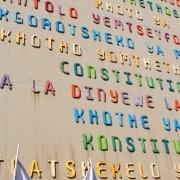|
Getting your Trinity Audio player ready...
|
Corruption Watch yesterday appeared in the Constitutional Court as amicus curiae in the matter of the Black Sash vs the minister of social development et al, with Freedom Under Law and the South African Post Office also making submissions.
Our submissions focused on the apparently pending interim agreement between Sassa and Cash Paymaster Services (CPS), as well as the red flags that could indicate the presence of corruption in the contract and grant payment process, as it stands to date.
Download our written submissions.
Suggestions and remedies
We were of the opinion that the interim arrangement is necessarily unlawful, because the regulatory provisions do not allow for Sassa to deviate from a competitive tender bid process in these circumstances. We argued that the process will not be fair, equitable or competitive and, as a result, is unlikely to be cost-effective.
However, because Sassa cannot take over the payment function from CPS, nor approach another contractor to do so from 1 April 2017, the only way of ensuring the uninterrupted payment of grants is to allow for some form of the unlawful interim arrangement.
We suggested that this is an opportunity for the court to minimise the duration of the unlawful interim arrangement; ensure that in the longer term Sassa’s conduct is lawful; and take steps towards establishing the causes of Sassa’s failure and holding the people responsible for the failure to account.
Although Sassa’s conduct over the past two years has been, at best, grossly incompetent, we cannot say with certainty that this is a result of corruption. However, many of the internationally recognised “red flags” or indicators of corruption are present, and this is cause for grave concern.
As remedy, we suggested that Sassa be provided with additional supervision and guidance. We also suggested that Adv. Wim Trengove, who has been engaged by Sassa as an independent third party to oversee the process of drawing up an interim agreement, remain involved for the entire duration of the interim contract. The court has the power to make this appointment.
Should Sassa and CPS draw up an interim agreement, we suggested that the court orders Sassa to file a copy of the contract, with an explanatory affidavit, to the court and all parties, and orders Sassa to make the record of its decision to conclude the interim contract available to the court and other parties.
We also suggested that the court refer the matter to the Public Protector and the Hawks for investigation into the possibility of corruption.







